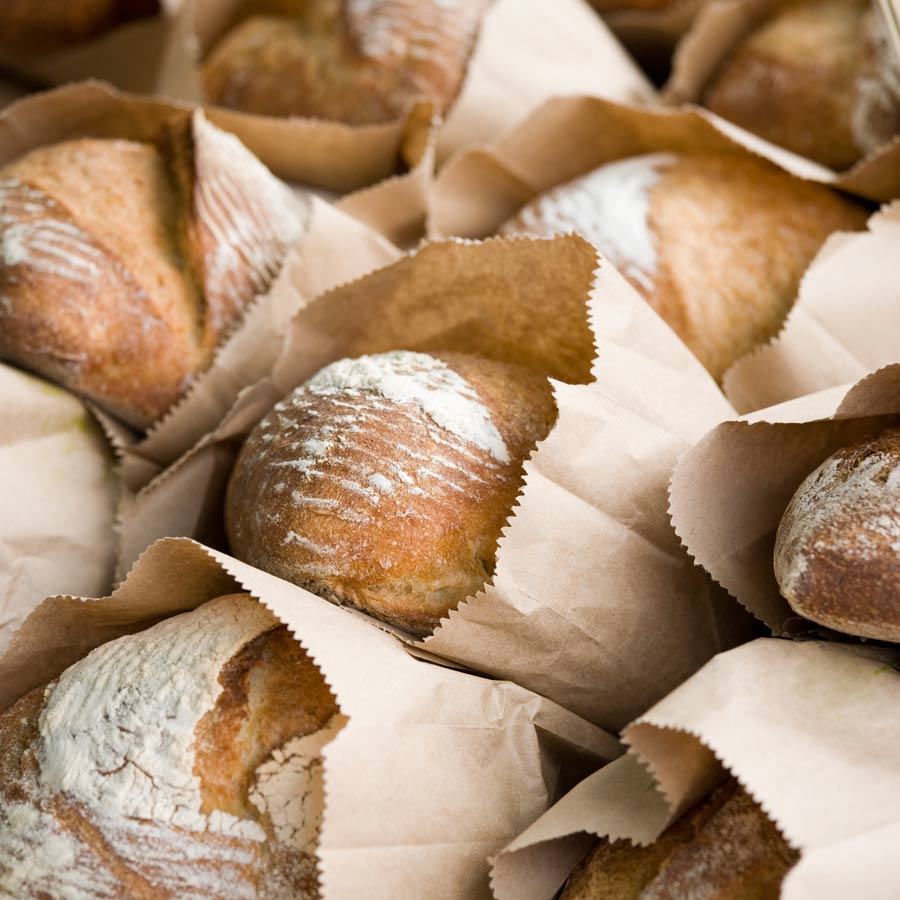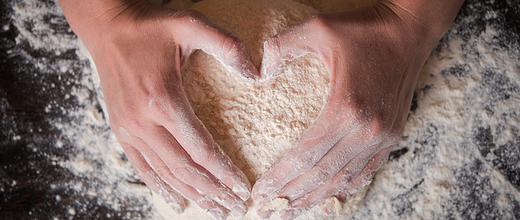The views expressed in our content reflect individual perspectives and do not represent the authoritative views of the Baha'i Faith.
I consider it a great blessing in my life that my wife and I have had some control over our career paths.
We were not destined by poverty to accept only one kind of employment, nor were we exposed to the kind of pressure, so common in wealthier families, to succeed according to very narrow definitions of class or prosperity. We’ve had time to figure out as adults and as a married couple how we will make a living—under the enormous constraints of today’s society—in ways that accord with our values and desires. In the decade we’ve been together, my wife and I both feel we’ve progressed a fair distance along a path of applying the Baha’i teachings to our work lives.
One part of how we make a living is a small seasonal venture that holds promise for further expansion. We bake bread in our licensed home kitchen and sell it at farmers’ markets in our area. We use flour milled from regionally-grown organic wheat to make sourdough, other sliced breads, bagels, ciabatta, and a semi-sweet whole wheat pastry that has an intense following among a handful of our customers.
 While I have no plans to quit my day job anytime soon, the bread business provides us a living wage for the time we put into it, thirty-two hours at the peak of the season, eight hours at the lowest point.
While I have no plans to quit my day job anytime soon, the bread business provides us a living wage for the time we put into it, thirty-two hours at the peak of the season, eight hours at the lowest point.
Everything we do in the business is shaped by various forces. The force of curiosity will lead us to try new recipes, techniques, and tools. Forces of biology, chemistry, and physics will determine which loaves rise beautifully and which ones become bricks in the oven. Market forces will elevate certain products and crush others through disinterest. Our business is tossed about by diverse and competing trends in diet and nutrition, such as organic, gluten-free, vegan, plant-based, additive-free, paleo, etc.
Baking large quantities of bread and selling it within 48 hours brings these forces together in a whirlwind that leaves us exhausted by the time it’s all over. But beneath the tumultuous waves of our laborious weekly baking cycle something shapes it all that can easily go unnoticed—the spiritual forces that help direct our vision and decisions.
We’ve learned one key idea: if we can content ourselves with things that fulfill our basic needs for food, water, shelter, clothing, energy, transportation, education and health care, then we are better suited to turn our focus to the higher matters of spirituality and service to others. As Abdu’l-Baha so beautifully wrote:
Is any larger bounty conceivable than this, that an individual, looking within himself, should find that by the confirming grace of God he has become the cause of peace and well-being, of happiness and advantage to his fellow men? No, by the one true God, there is no greater bliss, no more complete delight. – The Secret of Divine Civilization, pp. 2-3.
A society structured around this pattern can take care of all its members, so that no one will have to sacrifice all their time and energy just to survive. Because the endless accumulation of material things would not be the goal, the economy would give special attention to providing basic necessities for everyone. In that way, economic life will accomplish what it needs to, and stay out of the way of everything else.
As a result, the impulse to pursue quality, refinement, and beauty can be channeled into the simple things in life, such as good bread, rather than into burdensome luxuries. In a society that values spirituality and service to others and leaves no one in dire poverty, basic necessities will not be ugly, tacky, poorly made, or chock-full of preservatives and other additives. They will exude excellence in every way, because they will be the most prominent material outlets for humanity’s spiritual impulse to achieve perfection and radiate beauty.
Take for instance, a good loaf of anadama bread. This is a New England specialty made with a blend of wheat flour, cornmeal, and molasses. We bake ours with whole grain flour and blackstrap molasses which makes it not only hearty and sweet, but also a good source of vitamins and minerals. Getting anadama to rise properly requires extra care and attention. The cornmeal does not contribute to the rise, so the wheat in the dough has to do all the work. We don’t use artificial food additives that puff up the dough quickly at the expense of proper fermentation. Instead we rely on traditional biological processes that require time and skill, bring out more flavor, and increase the digestibility of nutrients. After handling the dough for our loaves five times over three and a half hours, they’re finally ready to go into the oven. Once they comes out, they’re gorgeous—even without doing anything for purely aesthetic reasons.
Anadama is neither fancy nor plain—it’s a delightful contribution to a balanced diet. It sustains a person, but does not bore them. It’s what I think of when I read these words of Baha’u’llah:
Eat ye, O people, of the good things which God hath allowed you, and deprive not yourselves from His wondrous bounties. Render thanks and praise unto Him, and be of them that are truly thankful. – Gleanings from the Writings of Baha’u’llah, p. 276.
The Baha’i teachings say that civilization has two sides: one is material and advances through the development and application of scientific knowledge; while the other side is spiritual, propelled by divine guidance and the influence of the Holy Spirit. Three years of baking bread commercially has allowed me a glimpse at a particular aspect of the following words of Abdu’l-Baha:
Had material civilization been combined with Divine civilization, these fiery weapons would never have been invented. Nay, rather, human energy would have been wholly devoted to useful inventions and would have been concentrated on praiseworthy discoveries. Material civilization is like a lamp-glass. Divine civilization is the lamp itself and the glass without the light is dark. Material civilization is like the body. No matter how infinitely graceful, elegant and beautiful it may be, it is dead. Divine civilization is like the spirit, and the body gets its life from the spirit, otherwise it becomes a corpse. – Selections from the Writings of Abdu’l-Baha, p. 317.
If the spiritual and material sides of life complement each other, rather than contradict one another, this obviously has implications for individual and collective spirituality. For the sake of our inner lives, we should not punish our outer selves. Likewise, the material side of life must be transformed in order to more fully reflect its compatibility with a life of spiritual excellence. Because our souls will change, the physical objects in our life will evolve also as a result.
This is what I feel we’re trying to do with our bread business—care for our own material needs and those of our customers in a way that honors the spiritual truth that there is more to life than what we consume, just as it says in the Bible: “Man does not live on bread alone but on every word that comes from the mouth of the Lord.” – Deuteronomy 8:3.

















Comments
Sign in or create an account
Continue with Facebookor